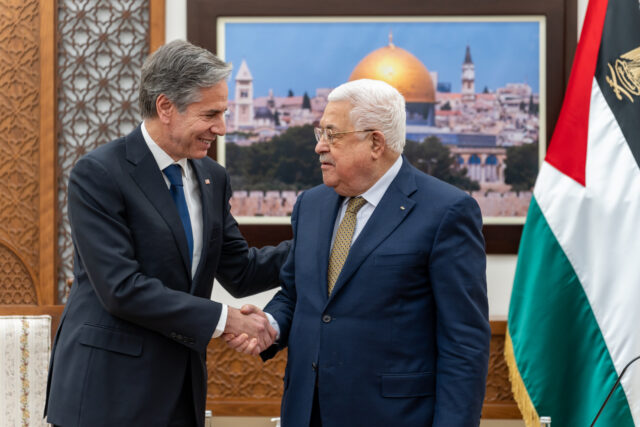
Ongoing U.S.-Israel-Saudi negotiations appear to feature demands by two of the three parties as prerequisites for “peace” between Israel and Saudi Arabia. And lately, another party—one that isn’t even at the negotiating table—is making its own demands in the background.
The original parameters for a deal were clear. The Saudis want a civilian nuclear program and “ironclad” U.S. security guarantees against Iran. America hopes to push the Saudis away from increasingly close relations with China, including by a guarantee to denominate oil sales in dollars rather than China’s preferred yuan, and a U.S. base in Saudi Arabia.
But the U.S. also insisted on “progress” toward a Palestinian state. This, according to U.S. Secretary of State Antony Blinken, would involve Israeli concessions to the Palestinian leadership. Another demand.
Saudi Arabia has taken up the baton to see whether or how the Palestinian Authority (PA) can be brought into the negotiations. It appears the kingdom is on an interesting track.
According to Palestinian sources, the Saudis are prepared to restore financial aid to the PA—but with two conditions. First that the PA establish and maintain “effective security throughout its territories.” And second, Saudi Crown Prince Mohammed bin Salman told Palestinian strongman Mahmoud Abbas in an earlier meeting, that the aid should “ease the life of the Palestinians.”
The first condition is an oblique reference to constraining Iranian proxies in the West Bank and getting a handle on Hamas in Gaza, both of which threaten Saudi Arabia and Israel. The second is a consideration of the lives of the people rather than the kleptocratic ruling elite, and has nothing to do with Palestinian political sovereignty.
As a sweetener, the Saudis named their ambassador to Jordan “non-resident ambassador to the State of Palestine and Consul General in Jerusalem.” The fact that neither the state of Palestine nor the Palestinian Consulate in Jerusalem exist was not discussed.
But even though they aren’t part of the deal, the Palestinians have “demands” too, and those demands are not congruent with Saudi conditions. According to The Times of Israel, Ramallah is seeking “irreversible” steps that will advance its bid for statehood. “There should be mutual obligations,” one Palestinian official said. “We need to see the unilateral steps [by Israel] stop in order to give a political horizon for a future between Israelis and Palestinians. Without one, there’s no telling what could happen tomorrow.”
The PA demands, for instance, that Israel end construction of houses for Jews in Judea and Samaria, military raids in Palestinian cities, and “settler violence” against Palestinians.
In exchange, the PA says it will abandon investigations it is pursuing against Israel in the International Criminal Court and the International Court of Justice. The PA had already promised to abandon them long ago, but never did.
To be clear, there are issues that are not up for discussion, according to the same PA official. “We are open-minded and prepared to negotiate all of the details, but nobody should instruct us how to deal with our internal issues,” he said, declining to elaborate.
Evidently not on the table are terrorism and incitement to violence against Jews; antisemitic speeches by PA leadership including Abbas and corresponding lessons in schools; plans for exclusive PA control of holy sites, Muslim, Christian, and Jewish; allowing Palestinian militias to cache weapons and explosives under civilian houses in the West Bank; ousting Iran from the West Bank and fighting Hamas; or abandoning “pay for slay” programs.
And while they’re at it, the Palestinians have demands for the United States too. The U.S., they claim, should back recognition of Palestinian statehood at the UN, reopen the U.S. consulate in Jerusalem, scrap congressional legislation characterizing the Palestine Liberation Organization as a terror organization, ensure the transfer of West Bank territory from Israeli to Palestinian control, and demolish “illegal outposts” in the West Bank.
Where is Israel in this conversation? Israel appears to have no non-negotiable demands of either Saudi Arabia or the United States. Even on the nuclear issue, Israeli Foreign Minister Eli Cohen has commented, but without a definitive “no.”
Israel and the Saudis appear to be on the same page as far as the Palestinians are concerned. Prime Minister Benjamin Netanyahu made it clear in his UN speech. “I’ve long sought to make peace with the Palestinians,” he said. “The Palestinians could greatly benefit from a broader peace. They should be part of that process, but they should not have a veto over the process. And I also believe that making peace with more Arab states would actually increase the prospects of making peace between Israel and the Palestinians.”
Those things that benefit the Palestinian people are good. Conditions that encourage war and Jew-hatred are unacceptable.
The U.S. government would do well to encourage Israeli-Saudi cooperation in all areas, including the West Bank, and not allow the process to be held hostage by outside demands.

